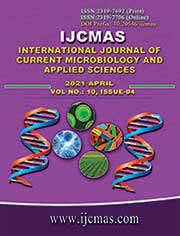


 National Academy of Agricultural Sciences (NAAS)
National Academy of Agricultural Sciences (NAAS)

|
PRINT ISSN : 2319-7692
Online ISSN : 2319-7706 Issues : 12 per year Publisher : Excellent Publishers Email : editorijcmas@gmail.com / submit@ijcmas.com Editor-in-chief: Dr.M.Prakash Index Copernicus ICV 2018: 95.39 NAAS RATING 2020: 5.38 |
Role of plants as medicines is immense as known through ages. There are enormous plants documented for their antibiotic properties. The present investigation was taken up to study the antimicrobial effect of ethanol extract of four plants viz, Senna italica Mill (Caesalpinoideae), Prosopis juliflora (SW.) DC., (Mimosoideae), Cressa cretica L. (Convolulaceae) and Schouwia purpurea (Forssk.) Schwein. (Brassicaceae), extracts against clinical isolates causing skin infections namely Escherichia coli, Klebsiella pneumoniae, Candida albicans, Pseudomonas aeruginosa, and Citrobacter species. The invitro antimicrobial activities were performed by agar well method and broth microdilution method. Two concentrations i.e. 1 mg/ml and 0.5 mg/ml of all the five plants extracts were tested against the bacteria. All the four medicinal ethanolic plant extracts possess potential antibacterial property against E.coli, Citrobacter, Klebsiella, Pseudomonas, & Candida species. Cressa cretica exhibited high activity against Klebseilla pneumoniae with inhibition zone 1.8 cm followed by Schouwia purpurea and Senna italica with 1.7 & 1.6 cm, respectively, against Citrobacter species, followed by Prosopis juliflora 1.5 cm against Pseodmonas aeruginosa. Resistant organism was Klebseilla pneumonia with 0.8 cm inhibition zone at the 0.5 mg/ml concentration of Senna italica but it was sensitive at 1 mg/ml concentration. Cressa cretica since it is a halophyte can prove to be potent antimicrobial agent after detailed and systematic bioprospection studies. All the plants under test are growing under xerophytic conditions and have enormous amount of secondary metabolites which makes them eligible candidates for bioprospection studies.
 |
 |
 |
 |
 |